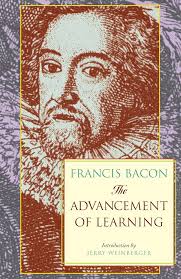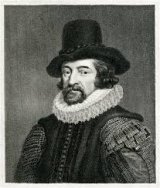The Advancement of Learning Page #15
The Advancement of Learning, published by Francis Bacon in 1605, is a foundational text in the history of science and philosophy. In this work, Bacon advocates for empirical research and the systematic organization of knowledge, laying the groundwork for the scientific method. The book critiques existing scholarly practices and proposes a new approach to learning based on observation and experimentation. It marks a significant shift towards modern scientific inquiry.
- Year:
- 1605
- 1,170 Views
Submitted by acronimous on August 11, 2024
Modified by acronimous on August 11, 2024
not a greater admirer of learning or benefactor of learning, a founder of famous libraries, a perpetual advancer of learned men to office, and familiar converser with learned professors and preceptors who were noted to have then most credit in court. On the other side how much Trajan’s virtue and government was admired and renowned, surely no testimony of grave and faithful history doth more lively set forth than that legend tale of Gregorius Magnum, Bishop of Rome, who was noted for the extreme envy he bare towards all heathen excellency; and yet he is reported, out of the love and estimation of Trajan’s moral virtues, to have made unto God passionate and fervent prayers for the delivery of his soul out of hell, and to have obtained it, with a caveat that he should make no more such petitions. In this prince’s time also the persecutions against the Christians received intermission upon the certificate of Plinius Secundus, a man of excellent learning and by Trajan advanced. (6) Adrian, his successor, was the most curious man that lived, and the most universal inquirer: insomuch as it was noted for an error in his mind that he desired to comprehend all things, and not to reserve himself for the worthiest things, falling into the like humour that was long before noted in Philip of Macedon, who, when he would needs overrule and put down an excellent musician in an argument touching music, was well answered by him again—“God forbid, sir,” saith he, “that your fortune should be so bad as to know these things better than I.” It pleased God likewise to use the curiosity of this emperor as an inducement to the peace of His Church in those days; for having Christ in veneration, not as a God or Saviour, but as a wonder or novelty, and having his picture in his gallery matched with Apollonius (with whom in his vain imagination he thought its had some conformity), yet it served the turn to allay the bitter hatred of those times against the Christian name, so as the Church had peace during his time. And for his government civil, although he did not attain to that of Trajan’s in glory of arms or perfection of justice, yet in deserving of the weal of the subject he did exceed him. For Trajan erected many famous monuments and buildings, insomuch as Constantine the Great in emulation was wont to call him Parietaria, “wall-flower,” because his name was upon so many walls; but his buildings and works were more of glory and triumph than use and necessity. But Adrian spent his whole reign, which was peaceable, in a perambulation or survey of the Roman Empire, giving order and making assignation where he went for re-edifying of cities, towns, and forts decayed, and for cutting of rivers and streams, and for making bridges and passages, and for policing of cities and commonalties with new ordinances and constitutions, and granting new franchises and incorporations; so that his whole time was a very restoration of all the lapses and decays of former times. (7) Antoninus Pius, who succeeded him, was a prince excellently learned, and had the patient and subtle wit of a schoolman, insomuch as in common speech (which leaves no virtue untaxed) he was called Cymini Sector, a carver or a divider of cummin seed, which is one of the least seeds. Such a patience he had and settled spirit to enter into the least and most exact differences of causes, a fruit no doubt of the exceeding tranquillity and serenity of his mind, which being no ways charged or encumbered, either with fears, remorses, or scruples, but having been noted for a man of the purest goodness, without all fiction or affectation, that hath reigned or lived, made his mind continually present and entire. He likewise approached a degree nearer unto Christianity, and became, as Agrippa said unto St. Paul, “half a Christian,” holding their religion and law in good opinion, and not only ceasing persecution, but giving way to the advancement of Christians. (5) There succeeded him the first Divi fratres, the two adoptive brethren—Lucius Commodus Verus, son to Ælius Verus, who delighted much in the softer kind of learning, and was wont to call the poet Martial his Virgil; and Marcus Aurelius Antoninus: whereof the latter, who obscured his colleague and survived him long, was named the “Philosopher,” who, as he excelled all the rest in learning, so he excelled them likewise in perfection of all royal virtues; insomuch as Julianus the emperor, in his book entitled Cærsares, being as a pasquil or satire to deride all his predecessors, feigned that they were all invited to a banquet of the gods, and Silenus the jester sat at the nether end of the table and bestowed a scoff on everyone as they came in; but when Marcus Philosophus came in, Silenus was gravelled and out of countenance, not knowing where to carp at him, save at the last he gave a glance at his patience towards his wife. And the virtue of this prince, continued with that of his predecessor, made the name of Antoninus so sacred in the world, that though it were extremely dishonoured in Commodus, Caracalla, and Heliogabalus, who all bare the name, yet, when Alexander Severus refused the name because he was a stranger to the family, the Senate with one acclamation said, Quomodo Augustus, sic et Antoninus. In such renown and veneration was the name of these two princes in those days, that they would have had it as a perpetual addition in all the emperors’ style. In this emperor’s time also the Church for the most part was in peace; so as in this sequence of six princes we do see the blessed effects of learning in sovereignty, painted forth in the greatest table of the world. (9) But for a tablet or picture of smaller volume (not presuming to speak of your Majesty that liveth), in my judgment the most excellent is that of Queen Elizabeth, your immediate predecessor in this part of Britain; a prince that, if Plutarch were now alive to write lives by parallels, would trouble him, I think, to find for her a parallel amongst women. This lady was endued with learning in her sex singular, and rare even amongst masculine princes—whether we speak of learning, of language, or of science, modern or ancient, divinity or humanity—and unto the very last year of her life she accustomed to appoint set hours for reading, scarcely any young student in a university more daily or more duly. As for her government, I assure myself (I shall not exceed if I do affirm) that this part of the island never had forty-five years of better tines, and yet not through the calmness of the season, but through the wisdom of her regiment. For if there be considered, of the one side, the truth of religion established, the constant peace and security, the good administration of justice, the temperate use of the prerogative, not slackened, nor much strained; the flourishing state of learning, sortable
Translation
Translate and read this book in other languages:
Select another language:
- - Select -
- 简体中文 (Chinese - Simplified)
- 繁體中文 (Chinese - Traditional)
- Español (Spanish)
- Esperanto (Esperanto)
- 日本語 (Japanese)
- Português (Portuguese)
- Deutsch (German)
- العربية (Arabic)
- Français (French)
- Русский (Russian)
- ಕನ್ನಡ (Kannada)
- 한국어 (Korean)
- עברית (Hebrew)
- Gaeilge (Irish)
- Українська (Ukrainian)
- اردو (Urdu)
- Magyar (Hungarian)
- मानक हिन्दी (Hindi)
- Indonesia (Indonesian)
- Italiano (Italian)
- தமிழ் (Tamil)
- Türkçe (Turkish)
- తెలుగు (Telugu)
- ภาษาไทย (Thai)
- Tiếng Việt (Vietnamese)
- Čeština (Czech)
- Polski (Polish)
- Bahasa Indonesia (Indonesian)
- Românește (Romanian)
- Nederlands (Dutch)
- Ελληνικά (Greek)
- Latinum (Latin)
- Svenska (Swedish)
- Dansk (Danish)
- Suomi (Finnish)
- فارسی (Persian)
- ייִדיש (Yiddish)
- հայերեն (Armenian)
- Norsk (Norwegian)
- English (English)
Citation
Use the citation below to add this book to your bibliography:
Style:MLAChicagoAPA
"The Advancement of Learning Books." Literature.com. STANDS4 LLC, 2025. Web. 10 Mar. 2025. <https://www.literature.com/book/the_advancement_of_learning_3165>.








Discuss this The Advancement of Learning book with the community:
Report Comment
We're doing our best to make sure our content is useful, accurate and safe.
If by any chance you spot an inappropriate comment while navigating through our website please use this form to let us know, and we'll take care of it shortly.
Attachment
You need to be logged in to favorite.
Log In